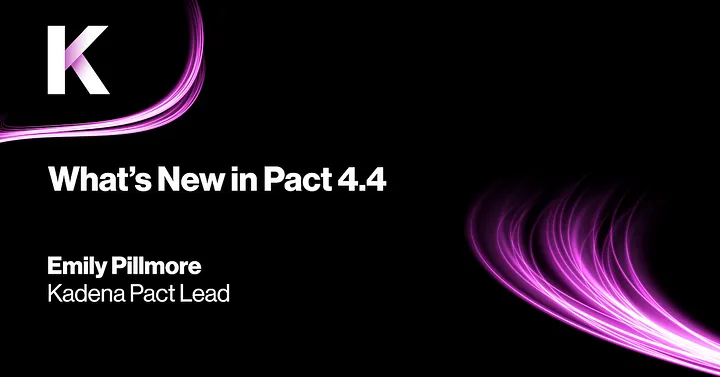What’s New in Pact 4.4
Every growing decentralized community needs builders. With the new cohorts of grantees selected by Kadena Eco being announced every week, the Pact engineering team has been hard at work soliciting feedback and developing features for dApp developers to build their projects with more security, robustness, and confidence than ever before. Pact 4.4 brings major improvements in functionality, auditability, and transparency — primitives for building the decentralized economies and marketplaces that continue to dominate crypto.
Among the changes Pact 4.4 will bring to the ecosystem is a general move towards
namespacing and principal account protocols becoming the norm. This is in
response to several improvements identified over the course of the Kadena
Improvement Process for k: account protocols that enable more robust
methodologies for working with on-chain governance. Kadena is introducing the
following as features for the language and network:
Namespaced Keysets
Keyset names have historically been un-namespaced, living in a global keyset registry on each chain. Due to the growing network contention for keyset names, as of Pact 4.4, all newly defined keysets will be required to be namespaced going forward. While in most cases, users never interact with keyset names, this will affect dApp developers and builders using Pact who wish to define smart contracts using their own custom governance, defined within their chosen namespace.
As an example, in code:

There are few times when a keyset name is of importance, and are limited to a few use cases:
-
enforce-keyset/enforce-guard
-
keyset-ref-guard
-
define-keyset
-
keyset name module governance
This change applies almost exclusively to builders and power users who are writing their own smart contracts or engaging in more sophisticated governance methods. This should make things less ambiguous for everyone!
Adding this feature also allows Kadena to lay the foundation for principal-namespaces — a feature that will be introduced to the community in the upcoming weeks.
Note: legacy keysets are not required to migrate. This change only applies to newly defined keysets. That is, legacy keysets will still work, and still be rotatable.
Gas adjustments for Format and Try
Gas was previously too lenient for both format and try, and has been
adjusted to be more accurate with respect to its actual computational cost. This
results in contracts that make use of either function to cost slightly more gas.
Most notably, KDA transfers via coin.transfer, coin.transfer-create and coin.transfer-crosschain will use more gas. Tool and dApp developers (such as wallets and exchanges) should adjust their gas limits appropriately.
These continuous improvements to our gas-model will eventually lead to adjustments in blocksize, but because of large effects that small lowlevel changes can have on network health, prudence dictates a conservative timeline for the rollout of these changes.
MUSL-based mathematical primitives
All the transcendental math functions in Pact (log, ln, exp, sqrt and pow) now rely on implementations of these functions from the MUSL library (https://www.musl-libc.org/). With this change, the implementation of these functions is now in high-precision plain C, allowing more consistent behavior across platforms, compilers, operating systems and processors. Previously, differences in how these functions were realized by the Haskell compiler could lead to scenarios in which values differed ever so slightly — enough to result in hash mismatches causing block validation failures and an inability to advance the chain for some nodes.
Please share your feedback with us on our Discord channel to help us improve tooling for our builders.

